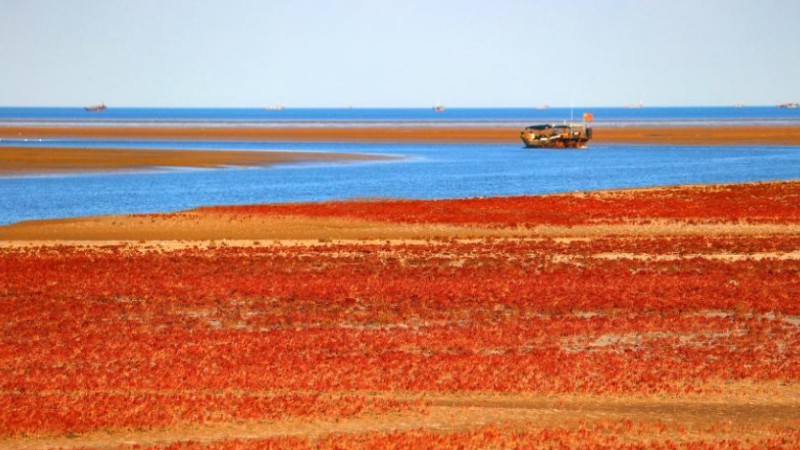Reinvestigation: Truth behind Belt and Road's "Debt Trap" myth
BEIJING, Oct. 18 (Xinhua) -- As the Belt and Road Initiative (BRI) marks its 10th anniversary, U.S. media once again are hyping up the "debt trap" narrative.
In a recent report, Voice of America (VOA), a state-owned news network and radio broadcaster of the United States, claimed that a part of BRI infrastructure projects are faced with controversies such as excessive debt, one-way trade and labor exploitation.
However, a closer look at the debt structure and facts will prove that the U.S. media is throwing dirt at the wrong party and transmitting a false proposition created out of thin air by the West.
FALSE ACCUSATION
Western financial institutions and multilateral institutions have always used the "debt trap" to plunder the wealth of developing countries, and now they are trying to pin it on the BRI, but the vast majority of developing countries and BRI partner countries see the truth behind the false narrative very clearly.
"China (Chinese entities) only holds 21 percent of Kenya's public external debt, with private creditors holding another 24 percent and multilateral institutions 45 percent," said a Briefing Paper titled "Integrating China into Multilateral Debt Relief: Progress and Problems in the G20 DSSI," released by the Johns Hopkins University in April.
In the case of Zambia, a majority of debts are owed to Western donors, multilateral institutions and bilateral ones, said Chibeza Mfuni, deputy secretary general of the Zambia-China Friendship Association.
"I think we must be factual. The interest rates from Western lenders are higher ... Countries have been stuck paying the interest, and the principal remains unpaid for a long time. What does that represent? It represents the rate of exploitation," said Mfuni, former deputy head of the Zambian mission in Beijing.
According to Lewis Ndichu, a researcher at the Africa Policy Institute in Nairobi, Kenya's debt challenges should not be attributed to China but to the spillover effects of the Ukraine crisis and global economic uncertainties.
"Kenya's debt dilemma is not a Chinese problem. It's not a China problem thing," said Ndichu.
DEBT RELIEF
Amid the growing concerns of a debt default, China has always adhered to the principle of equality in bilateral relations and proactively participates in just and fair negotiations with different nations, said Song Wei, a professor at the School of International Relations and Diplomacy, Beijing Foreign Studies University.
China is implementing the Group of Twenty's (G20) Debt Service Suspension Initiative (DSSI) in all respects and has suspended the largest amount of debt service payment among all G20 members. In August 2022, China announced that it would forgive 23 interest-free loans to 17 African countries and redirect 10 billion dollars of its International Monetary Fund reserves to nations on the continent.
"China fulfilled its role fairly well as a responsible G20 stakeholder implementing the DSSI in the challenging circumstances of the COVID-19 pandemic. In the 46 countries that participated in the DSSI, Chinese creditors accounted for 30 percent of all claims, and contributed 63 percent of debt service suspensions," Deborah Brautigam, director of the China Africa Research Initiative at Johns Hopkins University's School of Advanced International Studies, said in the briefing paper.
Since 2016, China, as a bilateral creditor, has been responsible for roughly 16 percent of global debt relief, surpassing the United States and the World Bank, and China's debt reduction has already doubled the average reduction scale of the G7 countries, according to Ding Yibing, dean of the School of Economics, Jilin University, in China.
"Among G20 members, China has provided the largest debt relief overall," said Ding. "However, China's proportion of debt to Africa as a whole is not high. Multilateral financial institutions and commercial creditors hold the highest share of debt. Even without China's debt, these countries still face high debt pressure."
For her part, Song said that she believes China is a genuine partner for developing countries crying out for capital to support nation-building projects.
"Moreover, debt suspension and relief should be a collective effort: multilateral, bilateral, commercial. China's proposal of shared responsibility in debt relief is fair and reasonable since all parties involved are creditors. It is unjust for only one side to bear the burden of debt reduction while others are exempted from their responsibilities," she said.
COMMON PROSPERITY
According to the white paper titled "The Belt and Road Initiative: A Key Pillar of the Global Community of Shared Future" released by China's State Council Information Office last week, by June 2023, China has signed more than 200 BRI cooperation agreements with more than 150 countries and 30 international organizations across five continents, yielding a number of signature projects and small-scale yet impactful projects.
Under the framework of the initiative, China has promoted mutual trade and investment, and never solicited one-way trade. From 2013 to 2022, the cumulative value of imports and exports between China and BRI partner countries was 19.1 trillion U.S. dollars, with an average annual growth rate of 6.4 percent. Cumulative two-way investment between China and partner countries came in at 380 billion dollars during the period, including some 240 billion dollars from China. And China had signed 21 free trade agreements with 28 countries and regions.
All BRI countries will benefit and achieve significant growth in their trade exchanges, as "the initiative opens new markets for them and encourages their products to access global markets," said Alaa Thabet, editor-in-chief of the Al-Ahram Newspaper.
Thabet emphasized that the BRI creates more infrastructure projects, services, industrial zones, and free zones for trade exchange, "so everyone participating in the initiative is a winner."
As a new paradigm of cooperation, the BRI provides a ladder for partner countries to pursue their dreams and modernization. By expanding economic globalization and distributing its benefits fairly, the BRI aims to promote global development that is balanced, coordinated, inclusive and shared by all, and brings win-win cooperation and common prosperity.
According to China's Ministry of Foreign Affairs, in 2022, bilateral trade between China and Thailand stood at 135 billion U.S. dollars, up 3 percent from the previous year, with China being Thailand's largest trading partner.
In war-ravaged Iraq, rebuilding homes and boosting the economy are top priorities. In 2015, China and Iraq signed a cooperation document on jointly promoting BRI cooperation. In recent years, a large number of projects, including a huge power plant in Wasit Province and a sewage treatment plant in Babylon Province, built by Chinese enterprises, have been successfully implemented.
These projects have enhanced local economic and social development, and the improvement of people's lives has fundamentally eliminated the root causes of instability.
In the process of BRI cooperation, China has helped participating countries construct industrial parks and provided guidance for Chinese enterprises to create jobs for locals through high-level industrial cooperation.
A McKinsey survey has revealed that Chinese firms in Africa recruit 89 percent of their employees locally, effectively contributing to local employment.
The World Bank has estimated that by 2030, BRI-related investment could lift 7.6 million people out of extreme poverty and 32 million out of moderate poverty.
Photos
Related Stories
- Xi announces major steps to support high-quality Belt and Road cooperation
- Xi says willing to work with UN to promote Belt and Road cooperation, world peace, development
- Interview: BRI drives global connectivity, prosperity, says Thai deputy PM
- Sinopec Chongqing SVW exports natural gas technology to Belt and Road partner countries
- BRI serves as efficient platform for building better world, say int'l officials, investors
Copyright © 2023 People's Daily Online. All Rights Reserved.









